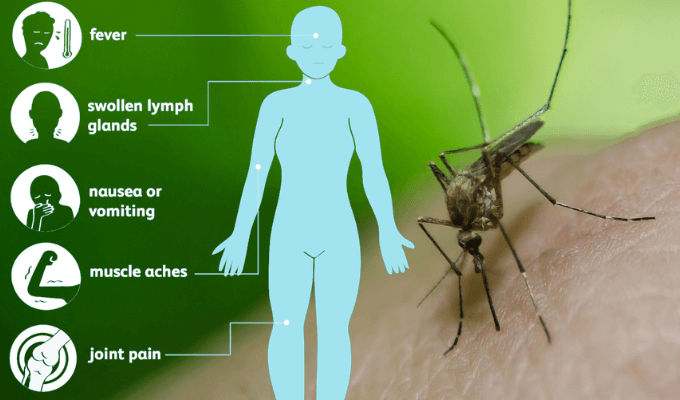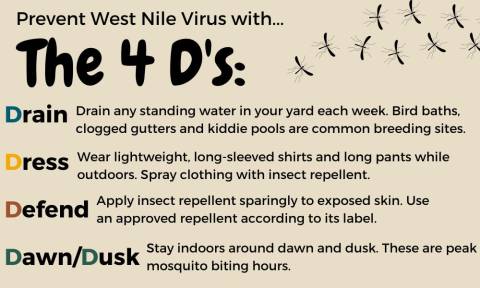West Nile Virus (WNV) is the leading cause of mosquito-borne disease in the US. It is spread to people by a bite from an infected mosquito. Most cases of WNV occur during mosquito season, which starts in the summer and continues into the fall. Until there is a hard freeze, mosquitos will remain active.
 CYCLE.png)
There is no vaccine to prevent or medications to treat WNV in people. The most common symptoms in humans are fever, body aches, and fatigue that can last for weeks or months. Less often, people develop severe illness such as swelling in the brain or spinal cord leading to weakness, paralysis, or death. While there are approximately 50 different species of mosquitoes in Nebraska, most mosquitoes do not transmit WNV.

SWNPHD provides data about possible WNV in the health district by trapping mosquitoes and sending them in for testing. The public will be notified of any mosquito pools that test positive for West Nile, and any positive cases. Public awareness and education is done through news releases, newspaper, radio, social media outlets and presentations at organizations and health fairs.
Although the chances of a person becoming ill are small, there are some simple steps you can take to reduce the chances of becoming infected with WNV.
Protection for yourself and others
- Ensure all doors and windows fit properly, and are equipped with tight fitting, fine mesh screen.
- Wear light colored, loose fitting, long sleeved shirt and pants.
- Minimize outdoor activity during dawn and dusk when mosquitoes are most active. Mosquitoes can be found in tall grass, bushes, and moist vegetation during the day.
- Equip baby carriages and strollers with fine mesh netting to protect infants.
- Use an EPA approved insect repellent on ankles, wrists, neck and ears; avoid areas around eyes, nose and mouth. Follow the manufactures instructions on when to reapply. DO NOT use on cuts, scrapes or on infants or pets.
- Wash all skin treated with repellent once you have returned indoors.
- Vaccinate horses with the WNV vaccine in the spring. West Nile Innovator Vaccines

Homeowner Control Tips
- Get rid of old tires, cans, bottles, jars, buckets, drums, or other containers, or keep them drained. Standing water in clogged gutters can also raise mosquitoes.
- Empty your small toddler-size plastic wading pool weekly and store it indoors when not in use. Make sure your backyard swimming pool is properly cared for while on vacation.
- Repair leaky pipes, outside faucets, and move air conditioner drain hoses frequently. Eliminate puddles created by lawn watering procedures.
- Change water and scrub vases holding flowers or cuttings twice each week - or grow cuttings in sand; scrub and change water in bird baths twice weekly; empty watering cans and pet dishes daily.
- If you are unable to drain standing water use mosiquito dunks. These are safe for people, fish, animals, and birds.
Reporting Dead Birds
Dead birds can be an indication that West Nile virus is present in an area. The general public is encouraged to report dead bird sightings so these can be tracked across the primary West Nile virus seasons (June 1 – September 30). At this time dead birds are not being collected or tested.
Report Dead Birds here: https://epi-dhhs.ne.gov/redcap/surveys/?s=E78D8A3JK4343E4X
